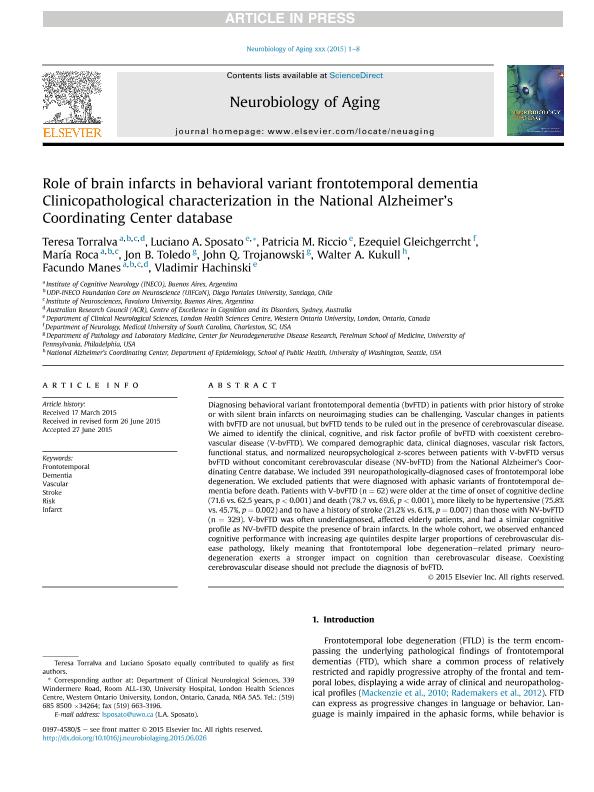Artículo
Role of brain infarcts in behavioral variant frontotemporal dementia: Clinicopathological characterization in the National Alzheimer's Coordinating Center database
Torralva, Teresa; Sposato, Luciano A.; Riccio, Patricia M.; Gleichgerrcht, Ezequiel; Roca, María ; Toledo, John B.; Trojanowski, John Q.; Kukull, Walter A.; Manes, Facundo Francisco
; Toledo, John B.; Trojanowski, John Q.; Kukull, Walter A.; Manes, Facundo Francisco ; Hachinski, Vladimir
; Hachinski, Vladimir
 ; Toledo, John B.; Trojanowski, John Q.; Kukull, Walter A.; Manes, Facundo Francisco
; Toledo, John B.; Trojanowski, John Q.; Kukull, Walter A.; Manes, Facundo Francisco ; Hachinski, Vladimir
; Hachinski, Vladimir
Fecha de publicación:
06/2015
Editorial:
Elsevier Science Inc
Revista:
Neurobiology of Aging
ISSN:
0197-4580
Idioma:
Inglés
Tipo de recurso:
Artículo publicado
Clasificación temática:
Resumen
Diagnosing behavioral variant frontotemporal dementia (bvFTD) in patients with prior history of stroke or with silent brain infarcts on neuroimaging studies can be challenging. Vascular changes in patients with bvFTD are not unusual, but bvFTD tends to be ruled out in the presence of cerebrovascular disease. We aimed to identify the clinical, cognitive, and risk factor profile of bvFTD with coexistent cerebrovascular disease (V-bvFTD). We compared demographic data, clinical diagnoses, vascular risk factors, functional status, and normalized neuropsychological z-scores between patients with V-bvFTD versus bvFTD without concomitant cerebrovascular disease (NV-bvFTD) from the National Alzheimer's Coordinating Centre database. We included 391 neuropathologically-diagnosed cases of frontotemporal lobe degeneration. We excluded patients that were diagnosed with aphasic variants of frontotemporal dementia before death. Patients with V-bvFTD (n = 62) were older at the time of onset of cognitive decline (71.6 vs. 62.5 years, p < 0.001) and death (78.7 vs. 69.6, p < 0.001), more likely to be hypertensive (75.8% vs. 45.7%, p = 0.002) and to have a history of stroke (21.2% vs. 6.1%, p = 0.007) than those with NV-bvFTD (n = 329). V-bvFTD was often underdiagnosed, affected elderly patients, and had a similar cognitive profile as NV-bvFTD despite the presence of brain infarcts. In the whole cohort, we observed enhanced cognitive performance with increasing age quintiles despite larger proportions of cerebrovascular disease pathology, likely meaning that frontotemporal lobe degeneration–related primary neurodegeneration exerts a stronger impact on cognition than cerebrovascular disease. Coexisting cerebrovascular disease should not preclude the diagnosis of bvFTD.
Palabras clave:
Frontotemporal
,
Dementia
,
Vascular
,
Stroke
,
Risk
,
Infarct
Archivos asociados
Licencia
Identificadores
Colecciones
Articulos(SEDE CENTRAL)
Articulos de SEDE CENTRAL
Articulos de SEDE CENTRAL
Citación
Torralva, Teresa; Sposato, Luciano A.; Riccio, Patricia M.; Gleichgerrcht, Ezequiel; Roca, María; et al.; Role of brain infarcts in behavioral variant frontotemporal dementia: Clinicopathological characterization in the National Alzheimer's Coordinating Center database; Elsevier Science Inc; Neurobiology of Aging; 36; 10; 6-2015; 2861-2868
Compartir
Altmétricas



